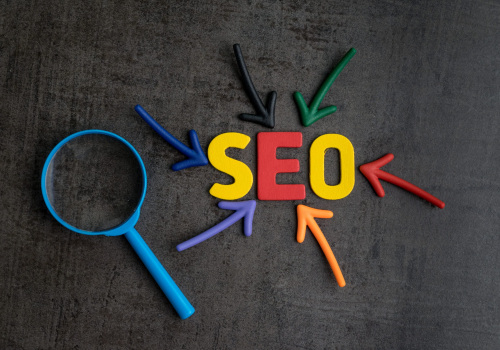Off-page SEO: Anything that happens outside your website that helps with your SEO strategy: backlinks. Technical SEO: anything technical done to improve search rankings: site indexing to help bots crawl. There are a total of 12 types of SEO. A brief description and the advantages of each are mentioned below.
Black-hat SEO exploits the weaknesses of Google's search algorithm to rank higher in its search results. Strategies for creating paid or spam links, keyword stuffing, concealment, etc. These practices provide instant results, but they can negatively affect your website if detected by Google. Therefore, it is recommended to avoid Black Hat SEO.
On-page SEO is the process of optimizing web page title tags, internal links, HTML code, URL, images, and many other page elements to improve ranking and user experience. Search engine optimization (SEO) for page factors includes: The main goal of technical SEO is to help Google bots successfully crawl, interpret and index the pages of your website. For example, creating an extensive XML sitemap and making your site mobile-friendly are just a few of the tactics used to help web spiders filter and classify your pages based on their content. For more information, check out our post on technical SEO.
International SEO improves your website's organic traffic from different areas and languages. If you want to succeed in international SEO, you must adapt to the cultural context of your target market and allow them to carry out transactions in their currency and language. Use the correct format for dates and times depending on where they appear. If you have any questions, talk in your native language.
International SEO aims to create a good online experience for your target audience. Your Ultimate Guide to Doing On-Page and Off-Page SEO. On-page SEO, also sometimes referred to as on-site SEO, is the process of optimizing the content of your website. This can include body text, keywords, headers, meta titles, meta descriptions, images, and more.
Incorporating on-page SEO into your marketing efforts is useful for search engines to understand the content of your site. And once Google understands your website, it can reward you by displaying it for the search queries it deems relevant. Off-page SEO is pretty much everything that doesn't happen on your website. Off-page SEO is about creating exposure and trust for your company, which can ultimately lead to more visitors and sales.
Most off-page SEO work focuses on building links. If you don't know, link building is the practice of getting other reputable websites to link to your site. Technical SEO refers to actions taken to help search engines crawl your website and improve the user experience (UX). As search engines and their algorithms become more complex, these requirements change, meaning that this type of SEO is always evolving.
To ensure that there aren't any problems with traceability and UX, your technical SEO efforts must be efficient. Local SEO is a variation of SEO that focuses on a specific area, rather than a national focus. It's about increasing your online presence in your community and promoting your products or services to local customers. Some ways to improve your local SEO include writing custom local landing pages, optimizing your local profiles, spamming Google Maps, creating local links, and more.
Website auditing Have your website audited through more than 200 checkpoint teams. Diverse team of more than 150 experts: Technical SEO. Technical aspects such as indexing, rendering, etc. Universal Analytics 360 deadline extended to 2024. In this post, we'll explain 12 different types of SEO (26%) how they are important for planning your organic search strategy to rank higher in organic search listings among your competitors.
On-page SEO refers to the technical processes used to optimize tags, content, images, internal links, and other elements of a page that improve its visibility to search engines. Off-page SEO refers to everything you do outside of your site to get better results and appear higher on Google's SERPs. It includes working on external ranking factors, such as building links from trustworthy sites on the same domain as you, successful social media marketing, getting customers to give you a positive review in various online forums, and so on. If you want to know more about it, you can read our detailed post on off-page SEO techniques.
The most important activity in off-page SEO optimization is creating links and obtaining backlinks. Link building is a process that involves obtaining links for your website on other relevant websites to show the value and authority of your content to search engines. Another factor in off-page SEO is social media. Social media channels can help you improve your traffic.
If there are a good number of conversations on social media channels such as Twitter, LinkedIn, Facebook, etc. Having content that gets shared a lot on social media or that generates conversation can generate a lot of organic traffic, increasing the SEO of your website. Technical SEO goes a long way to helping Google bots successfully crawl, interpret, and index all the pages on your site for future use. Creating a complete XML sitemap, making your site mobile-friendly, adding structured data to help web crawlers sort and classify your pages based on the type of content they contain are just some of the techniques used.
Check out our in-depth post on what technical SEO is for more information. Technical SEO is a type of SEO that involves on-site auditing and optimizing technical elements to improve website performance and SERPs. Technical SEO focuses primarily on improving the functionality and performance efficiency of your website. For example, search engines like Google often give preference to rankings to websites that have a highly responsive design and a crawlable website architecture.
Search engines also give preferences to websites that have a seamless mobile-friendly website. Having weak technical SEO on your website can even result in search engines penalizing you. There are many elements involved in this type of on-page SEO. For example, using a secure HTTPS connection and caching the information of any multimedia content on the page can improve page load time.
Other technical SEO elements include loading sitemaps, refining the HTML code, meta tags, alternative text, and more. Another important aspect of technical SEO is to optimize the HTML of each page. A process such as schema markup tells search engine algorithms what exactly is on your web pages. This helps crawlers easily determine the purpose of your page, its content, and more.
In the same way, using the right type of redirects for your page can also improve its health. White hat SEO refers to all optimization techniques that meet Google search engine guidelines. While you have to be patient to see results, they are sustainable and create genuine goodwill around your brand. In addition, there is no risk of your site being banned or showing up in search results if there is a new algorithm change.
Overall, white hat SEO is low risk and big rewards if you do it right. Some examples of white hat SEO techniques include creating useful and relevant content after doing extensive keyword research, obtaining links from high-authority sites based on the merit of the content on the page, and so on. After COVID-19, digital marketing will increase in importance multifold and the winners will be those who can attract more traffic to their sites and SEO will become more important. Technical SEO has nothing to do with the content of your page.
However, it can improve your appearance in organic search results. Most digital marketing newbies confuse technological SEO with black hat SEO. While technical SEO aims to improve the user experience by optimizing the website, black hat SEO reduces it. The average attention span of people is 8 seconds.
If you capture the attention of your visitors with your metadata, you have less than 8 seconds to show them that your website contains the information they need. Your site's load time should take more than 2 seconds of that time. Sometimes, a small mistake in the code can make your website completely invisible to bots from Google or other search engines. In addition to the codes, your page may have other problems, such as the lack of H1 and H2 tags and the duplication of metadata.
Local SEO is one of the types of SEO that is more location-specific than the others. Local SEO deals with rankings in a specific state, city, or town. The main idea is to increase a company's online presence within its state. Local SEO is a subset of SEO that involves some activities that are unique to local businesses.
The goal of local SEO is to increase the ranking of search queries with local intent. This type of SEO is essential because it allows you to reach your customers at the right time and in the right place, giving them the best possible experience. It's probably no surprise that the most popular types of SEO services (such as services sold by a typical SEO agency) closely reflect the four different types of SEO. No matter what type of SEO you want to do, you should add some media files to your content to increase your chances of ranking.
There are around 12 different types of SEO that help websites rank better on search engine results pages. Thank you for sharing the excellent article about the types of SEO, it's very easy for a digital marketer to understand. The local SEO strategy for local businesses is one of the most important types of SEO, as it helps the company to be more visible in local search results on Google. It's one of the most important types of SEO in digital marketing that directly affects the ranking and overall visibility of your website.
Getting your website ranked on Google or any other search engine can be a daunting task, especially when you don't have a full understanding of the different types of SEO and when to use each of them. It's no wonder that the most popular off-page SEO services include (you guessed it) different types of link building services. Thank you very much for the informative article about the types of SEO, it's easy to read and understand the publication, I really like your article. Learning about the different types of SEO services is a lot like learning to read the back of a food label in German.
Although it doesn't seem like any kind of SEO effort, it helps you attract more traffic to your site, which in turn helps search engines consider your site as an authority in the field. .






